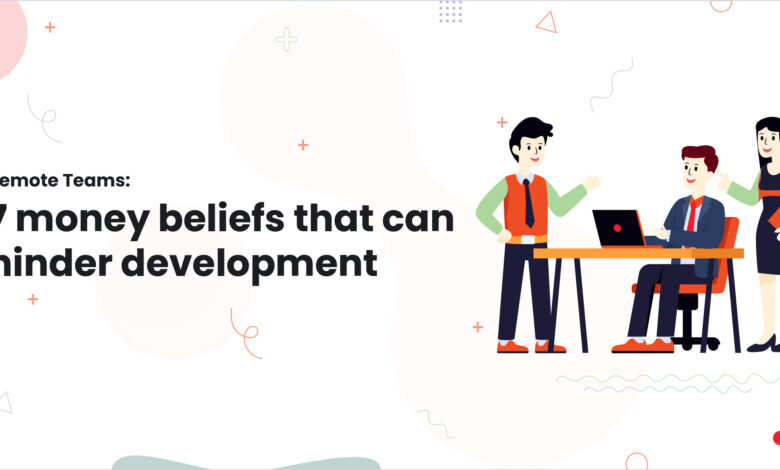Remote Teams: 7 money beliefs that can hinder development

Introduction
Limiting beliefs about money can significantly hinder personal and professional growth, especially in the context of remote work environments. These beliefs often stem from societal conditioning, childhood experiences, and personal encounters with financial challenges.
Understanding these beliefs and implementing effective strategies to overcome them can pave the way for financial success and a healthier relationship with money. This guide will cover everything about common limiting beliefs, their implications, relevant statistics from a remote team perspective, and actionable strategies, particularly through the lens of remote team development.
So, let’s get started! First let us understand what is Remote work or what are remote teams?
What is Remote work or what are remote teams?
When a group of IT professionals collaborate together from various parts of the world to work on one software development project without the need to visit a physical office space is known as a remote teams. The Work done in this method is called remote work.
Now, further let us understand the common limiting beliefs about money
Common Limiting Beliefs About Money
- The Scarcity Mindset
- Worthiness
- Fear of Change
- Money is Hard to Make
- Money is the Root of All Evil
- If I Win, Someone Else Loses
- Making Money is Selfish
Statistics on Financial Behavior and Remote Teams
Understanding the financial landscape in the context of remote work can help contextualize these beliefs. Here are some key statistics related to financial behavior and beliefs among remote workers:
| Statistic | Description |
|---|---|
| 55% | Percentage of US respondents who believe their industry can work effectively from home, with digital fields like finance seeing a jump to 75% . |
| 56% | Percentage of the non-self-employed US workforce that has jobs conducive to remote work at least some of the time, translating to roughly 75 million workers . |
| 36.2 million | Projected number of Americans who will be remote workers by 2025, indicating a significant shift in work dynamics . |
| 82% | Percentage of executives who expect to offer remote work options post-pandemic, reflecting a long-term commitment to remote work . |
| 75% | Percentage of virtual teams worldwide that say remote collaboration allowed them to be more effective in their jobs . |
| 37% | Percentage of remote workers who fear that working virtually means less visibility to leadership, potentially impacting their financial growth . |
| 60% | Percentage of executives planning to prioritize spending on tools for virtual collaboration and training for remote managers . |
7 Common Limiting Beliefs About Money
1. The Scarcity Mindset
Belief: “There’s never enough money.”
The scarcity mindset convinces individuals that resources are limited, leading to feelings of anxiety and fear regarding financial stability. This belief can result in hoarding behaviors, poor financial decisions, and a reluctance to invest in opportunities.
Strategies to Overcome:
| Strategy | Description |
|---|---|
| Shift Focus | Encourage team members to focus on what they have rather than what they lack. This can be facilitated through team discussions that highlight successes and available resources. |
| Define Abundance | Have team members articulate what abundance means to them through virtual workshops, fostering a sense of community and support. |
| Remote Team Development | Utilize remote collaboration tools to create a shared platform for recognizing and celebrating financial wins, no matter how small. This helps cultivate a mindset of abundance within the team. |
2. Worthiness
Belief: “I don’t deserve to be wealthy.”
Feelings of unworthiness can stem from societal narratives that associate wealth with greed or moral failure. This belief can prevent individuals from pursuing financial opportunities or negotiating for higher salaries.
Strategies to Overcome:
| Strategy | Description |
|---|---|
| Explore Origins | Encourage team members to reflect on where these beliefs originated through group discussions or one-on-one coaching sessions. |
| Cultivate Self-Worth | Implement team-building activities that reinforce the value each member brings to the table, helping shift perceptions of worthiness. |
| Remote Team Development | Create a mentorship program within the remote team, pairing less experienced members with those who have successfully navigated financial growth. This fosters a sense of belonging and reinforces the idea that wealth is attainable. |
3. Fear of Change
Belief: “Having a lot of money will change me or my relationships.”
This belief often stems from the fear that wealth will alter personal identity or social dynamics. Individuals may worry that they will be judged or that their relationships will suffer if they become wealthy.
Strategies to Overcome:
| Strategy | Description |
|---|---|
| Discuss Fears Openly | Create a safe space for team members to express their fears about wealth and change. Open dialogue can help normalize these feelings and reduce anxiety. |
| Visualize Positive Outcomes | Encourage team members to visualize how financial success can positively impact their lives and relationships through guided visualization exercises during team meetings. |
| Remote Team Development | Organize virtual retreats focused on personal growth and financial empowerment, helping team members confront their fears in a supportive environment. |
4. Money is Hard to Make
Belief: “Money is hard to obtain.”
This belief often arises from negative experiences with money, leading individuals to view financial success as a daunting task. This mindset can result in self-sabotage and missed opportunities.
Strategies to Overcome:
| Strategy | Description |
|---|---|
| Reframe the Narrative | Encourage team members to replace negative thoughts with empowering affirmations. For example, instead of thinking, “I’ll never make enough,” they can say, “I am capable of creating financial opportunities.” |
| Track Financial Wins | Implement a system where team members track all sources of income, no matter how small, reinforcing the idea that money can come from various avenues. |
| Remote Team Development | Leverage remote collaboration tools to share resources and tips on income generation. Regularly scheduled brainstorming sessions can help generate new ideas for income streams. |
5. Money is the Root of All Evil
Belief: “Rich people are inherently bad or greedy.”
This belief can create a moral dilemma around the pursuit of wealth, leading individuals to shy away from financial success due to fear of being perceived negatively.
Strategies to Overcome:
| Strategy | Description |
|---|---|
| Expand Perspectives | Encourage team members to engage with successful individuals who use their wealth for positive impact through virtual guest speakers or panel discussions. |
| Focus on Value Creation | Shift the focus from money to the value that can be created through financial success. Discuss how wealth can be used to support causes and communities. |
| Remote Team Development | Foster a culture of giving back within the remote team by organizing virtual charity events or volunteer opportunities that emphasize the positive impact of financial resources. |
6. If I Win, Someone Else Loses
Belief: “There’s not enough for everyone.”
This belief fosters a competitive mindset where individuals feel that financial success for one person equates to loss for another. This can create a toxic atmosphere of jealousy and resentment.
Strategies to Overcome:
| Strategy | Description |
|---|---|
| Collaborative Goals | Set team financial goals that require collaboration and support, emphasizing the idea that success can be shared and celebrated collectively. |
| Educate on Abundance | Provide resources that educate team members on the abundance mindset, highlighting how wealth can grow and benefit many. |
| Remote Team Development | Use team-building exercises to reinforce the idea of collective success. For example, virtual challenges that reward the team as a whole can foster unity and collaboration. |
7. Making Money is Selfish
Belief: “Earning money means I don’t appreciate what I have.”
This belief can prevent individuals from pursuing financial opportunities due to guilt or shame. It creates a dichotomy between wealth and gratitude.
Strategies to Overcome:
| Strategy | Description |
|---|---|
| Create Value | Encourage team members to focus on how their work creates value for others, helping shift the narrative from selfishness to service. |
| Celebrate Contributions | Regularly recognize and celebrate team members’ contributions to the organization and community, reinforcing the idea that making money can also mean making a difference. |
| Remote Team Development | Organize virtual workshops focused on social entrepreneurship and the positive impacts of wealth, highlighting stories of individuals who use their success to uplift others. |
Now, further let us understand how Acquaint Softtech can help you meet your remote team work requirements.
How can Acquaint Softtech help?
In 2013, Mr. Mukesh Ram realized his dream of becoming an IT outsourcing company. Acquaint Softtech is an Indian-based company that specializes in software development outsourcing and IT staff augmentation.
At Acquaint Softtech, our area of expertise is assisting entrepreneurs and company owners in filling the talent shortages in their IT teams by helping them to hire remote developers who possess the necessary qualifications.
Additionally, we offer MERN stack development and MEAN stack development services as an official Laravel partner. Hiring remote developers is advised if your company is having trouble finding cost-effective resources for your inside team. Whether you’re looking to hire MERN stack developer or hire MEAN stack developer, Acquaint Softtech helps you hire remote developers for as little as $15 per hour.
Conclusion
Overcoming limiting beliefs about money is essential for achieving financial success and well-being, especially in the context of remote work. By understanding these beliefs and implementing effective strategies particularly through remote team development, individuals can build a healthier relationship with money.
Encouraging open dialogue, celebrating successes, and providing opportunities for personal growth can empower team members to challenge their limiting beliefs and unlock their financial potential. By embracing an abundance mindset and supporting one another, remote teams can create a culture of financial empowerment that benefits everyone involved.



